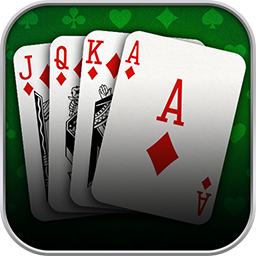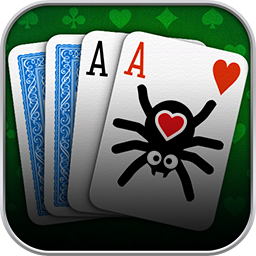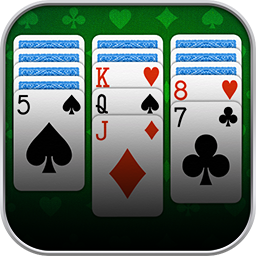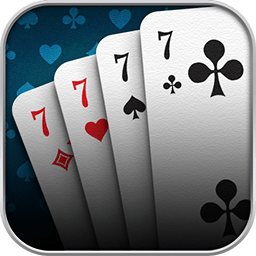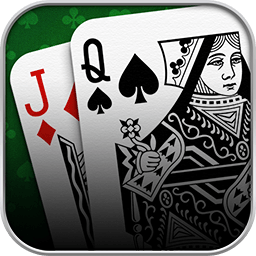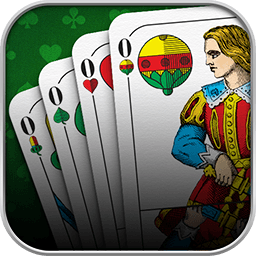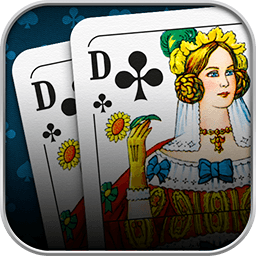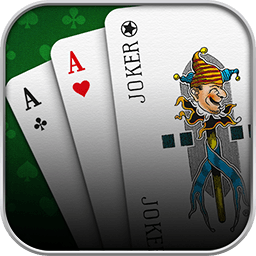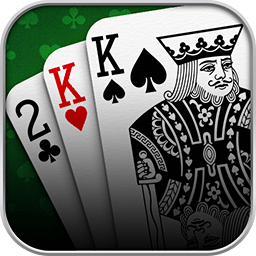Use this alphabetic overview over all important Whist terms: Get in the know quickly or become a proper Whist connoisseur! And in our Bid Whist Manual, you see how all the pieces come together.
Bid Whist:
This is a trick-taking game based on Classic Whist for two partnerships. Bid Whist is characterized by additional components, such as a bidding phase, different game types, Jokers, and a kitty. You try to win as many tricks as possible in a round.
Bid:
In Bid Whist, you can make a bid during bidding. A bid consists of a number between three and seven and a suffix – Uptown, Downtown, or No Trump. The number indicates the number of points you will attempt to make. The suffix points to the game type you want to play. After making a bid, you cannot change it.
Bidding:
In Bid Whist, there is a bidding phase before trick-taking, consisting of only one round of clockwise bidding. When it is your turn, you must either bid higher than the previous player or pass.
Once all players bid or passed, the player with the highest bid wins the bidding. They are declarer: Their bid determines the order of card ranks during trick-taking or the absence of a trump suit. And now, this player declares the final part of their contract (the trump suit or the order of card ranks during trick-taking).
After that, they pick up the kitty, then discard the same number of cards to improve their hand, and the trick-taking begins.
Card Deck:
Traditionally, Bid Whist uses one set of playing cards: 54 playing cards in the American Poker pattern pack. All 13 ranks, from Two to Ace, each appear in the four familiar suits: Clubs, Spades, Hearts, and Diamonds. And two Jokers are added. In Bid Whist, the card order depends on the chosen game type.
Card Order:
The order of ranks, and thus a card’s strength, depends on the declarer’s chosen contract. If applicable, trump cards beat all non-trump cards.
In classic Uptown rounds, the cards within a suit follow the traditional rank order from strong to weak: Ace, King, Queen, Jack, Ten, …, Two. In the Trump suit, the Jokers move before the Ace as the two strongest trumps: Big Joker, small Joker, Ace, King …
In classic Downtown rounds, the cards within a suit follow an inverted rank order from strong to weak: Ace, Two, Three, …, Ten, Jack, Queen, King. In the Trump suit, the Jokers move before the Ace as the two strongest trumps: Big Joker, small Joker, Ace, Two, …
In No Trump rounds, the cards are sorted in uptown or downtown fashion, depending on the contract. As there is no trump suit, the Jokers are the weakest cards, not belonging to any suit. Any other card is stronger than a Joker here.
Classic Whist:
See Whist.
Contract Whist:
This is a game of the Whist family that has many different names: Oh Hell and Oh Pshaw, to name a few. Four players compete for themselves, trying to gain points by predicting how many tricks they will win per round. They start the table with one hand card each, and they each get one more hand card to start with per round.
Contract:
This is what the declarer announces after bidding and before trick-taking. A contract consists of three parts: The number of points they intend to make with their partnership, the order of the ranks, and the selected trump suit or its absence. If a partnership fails to fulfill their contract, they lose points according to their bid.
Custom Rules:
When creating a Bid Whist table at the Whist Palace, you can adjust the game to your liking. Choose from the rules Declarer Always Leads, Jester, Low Beats High, No Jokers, Single NT, Small Kitty, Sport the Kitty, and Training.
Dealer:
That is the player position before the forehand in the turn order. As the dealer, you shuffle and deal the cards. At the beginning of a table, the dealer is determined at random. Each round, that position moves one seat clockwise.
Declarer:
By winning the bidding, you become the declarer. You get to declare the trump suit as well as the order of ranks. You announce that in your contract before picking up and then discarding the kitty. Your partnership needs to win at least as many points as the number in your bid suggests.
Declarer Always Leads (Custom Rule):
Instead of forehand, the declarer always leads the first trick of a round.
Downtown:
This is one of the options you can choose from when formulating your contract in Bid Whist, and it is the counterpart of Uptown. Downtown means that you play a round with the card ranks sorted in inverted fashion, with Aces and Twos being the strongest and Queens and Kings being the weakest ranks of a suit. If you bid a Downtown game, you need to specify the trump suit in your contract before trick-taking. If you bid a No Trump game, you specify in your contract whether you play Uptown or Downtown.
Follow Suit:
When playing cards to a trick, you must follow the suit of the trick’s first card, i.e., you must play a card of the same suit. When you do not have a fitting card of the required suit, you are free to play any card from your hand: You can either play a trump card for a chance to win the trick or sacrifice a non-trump card.
If the first card of a trick is a trump card, you need to play a trump card in order to follow suit. That can also be a Joker. In No Trump rounds, the Jokers are suitless. If you open a trick with a Joker in such a round, the next player can play any card. The first non-Joker card determines the suit that the remaining players need to follow.
Following suit is also referred to as serving a suit.
Forehand:
That is the player position left to the dealer in the turn order. As the forehand, you get to play a round’s first trick’s first card. At the beginning of a table, the dealer’s position is determined at random. Each round, all positions move clockwise by one seat.
Game Type:
In Bid Whist, the declarer announces the game type as part of the contract for the current round.
The game type in turn contains two pieces of information: The first part clarifies if there is a trump suit and, if yes, which suit is trump. The second part carries information about the order of card ranks, in other words: If you are playing Uptown or Downtown. This means that there are 10 possible game types.
During bidding, the suffix of your bid gives some information on the game type you want to play.
Jester (Custom Rule):
In a game of No Trump, you can always play Jokers in your turn, even if you have a card of the leading suit.
Joker:
In Bid Whist, two Jokers are added to the basic card deck with 13 ranks in four suits each. The role of the Jokers depends on the game type: In rounds with trump (Uptown and Downtown), both Jokers belong to the trump suit. They are the strongest cards in the game, and one Joker is stronger than the other.
But if No Trump has been declared, the Jokers are the weakest cards: They don’t belong to any suit, and they can never win a trick. If you open a trick with a Joker, the next player can play any card. The first non-Joker card determines the suit that the remaining players need to follow.
Kitty:
During dealing some cards are put aside face-down on the table. This stack is the kitty. After bidding, the declarer announces the contract and then adds the kitty to their hand before discarding the same number of cards. After that, the trick-taking begins.
Leading Suit:
The first card played in each trick determines the trick’s leading suit. And the other players must follow it: If it is Spades, for example, the other players must also play a card of Spades in this trick, if they have one. In case the first card is a trump card, trump is the leading suit. In that case, all cards of the trump suit, including the two Jokers, qualify for following suit. Non-trump cards of any other suit can never beat a card of the leading suit.
Low Beats High (Custom Rule):
During bidding, Downtown bids beat Uptown bids of the same number if this custom rule is active.
No Jokers (Custom Rule):
There are no Jokers. The kitty is reduced by two cards. If the custom rule Small Kitty is active too, there will be no kitty at all.
No Trump:
This is one of the options you can choose from when formulating your contract in Bid Whist. No Trump means that you play a round without any trump cards. As a result, the Jokers become the weakest cards. If you bid a No Trump game, you need to specify the rank order Uptown or Downtown in your contract before trick-taking.
Non-Trump:
Any card that neither belongs to the selected trump suit nor is a Joker is a non-trump card. In No Trump rounds, Jokers become suitless non-trump cards as well.
Number (Bid):
This is the first part of the bid you can make in Bid Whist. The number indicates the number of tricks above six you will attempt to take; the minimum is three. If you become declarer, your partnership must reach at least the bid’s number of points. Otherwise, you will lose points for overbidding.
Uptown and Downtown bids of the same number are equal, while No Trump bids of the same number overtop them.
Oh Hell:
See Contract Whist.
Overbidding:
If you are the declarer in Bid Whist, and your partnership fails to fulfill the contract, this is considered overbidding. In that case, your partnership loses points according to your bid.
Example: If you play a game of 4 Uptown, and your partnership only wins nine tricks, your partnership loses four points because you bid four but only reached three points!
Additionally, there is a Chips fee as a penalty for overbidding that only the declarer must pay to the bank at the Whist Palace. This is in place because we encourage you only to announce contracts you think you can win, while we discourage high bids for the sake of becoming declarer and thwarting other players’ bids. The fee’s exact amount is listed in the table requirements and depends on the table’s entry fee.
Partnership:
In Bid Whist, you always play with four players in two partnerships. Players of the same partnership sit at opposite sides of the table and collect tricks, and thus points, together. Partnerships remain the same throughout all rounds of the table until the game ends.
Pass:
In Bid Whist, there is a bidding phase before trick-taking, consisting of only one round of clockwise bidding. When it is your turn, you must either bid higher than the previous player or pass. Passing means you make no bid and cannot become the declarer. If the first three players pass, then the dealer is forced to bid and become the declarer.
Points:
You win or lose points at the end of each round, depending on the number of tricks your partnership collects as well as the declarer’s contract.
Basically, each trick over six tricks is worth one point. And if your partnership plays against the declarer, you automatically get these points.
But being the declarer, your partnership must reach at least the number of points you bid. If your partnership fulfills that condition, you get one point for each trick above the sixth. If your partnership misses that condition, you overbid and lose points according to your bid.
Additionally, all points in a round are doubled if No Trump is declared.
The points for each round are tallied per partnership. The table ends after your selected number of rounds is completed or after one partnership reaches seven or seven negative points. Finally, the team with the most points wins.
Rank:
The rank and the suit define a card. The ranks in Whist are Ace, Ten, King, Queen, and Jack, and the numbers from Ten to Two. Every rank occurs once in each suit. In Bid Whist, two rankless and suitless cards are added – the Jokers.
Round:
A typical table of Bid Whist lasts multiple rounds. A round begins with dealing and ends with scoring the points after the last trick was taken. Each round’s points are collected to determine the total score of a table. During table creation, you can set a maximum number of rounds.
Single NT (Custom Rule):
If a game of No Trump was declared, the points in this round are not doubled anymore.
Small Kitty (Custom Rule):
The kitty is reduced by four cards, which are dealt to the players instead. The cards discarded by the declarer after picking up the kitty do not count as a trick for the purpose of scoring points anymore. If the custom rule No Jokers is active too, there will be no kitty at all.
Sport the Kitty (Custom Rule):
The kitty is briefly revealed to all players before the declarer picks it up and continues with discarding as usual.
Strength:
Each card has a certain strength in trick-taking. The strongest card wins the trick. A card’s strength is connected to its rank, its suit, and the game type of the round. See the glossary entry card order for details on the card order in each game type.
Suffix (Bid):
This is the second part of the bid you can make in Bid Whist. The suffix announces which game type you would play if you become declarer. You can choose between Uptown, Downtown, or No Trump. Before the suffix comes the number.
Suit:
The suit and the rank define a card. In Whist, the four suits are usually Clubs, Spades, Hearts, and Diamonds. Every rank occurs once in each of them.
Table:
At the Whist Palace, you play at tables. Each table’s number of players, maximum number of rounds, bet, and active custom rules are determined beforehand. A game at a table ends if either one partnership reached the necessary score or you played the maximum number of rounds. After the last round, the final scores are determined, and you return to the lobby. If a Premium player is among you, you get the chance to play another table with the same players under the same conditions.
Team:
See Partnership.
Training (Custom Rule):
This table does not affect the league or your skill ranking. But you still gain experience points.
Trick:
A set of four cards, each played by one player during the game’s trick-taking phase, is one trick. Thus, the trick-taking phase consists of 12 tricks in Bid Whist. That number can vary depending on active custom rules. The player contributing the strongest card gets to take the trick and begin the next one.
Trick-Taking:
That is the main phase of a round. It ensues after the declarer discards the kitty. During trick-taking, you play your hand cards in order to gain as many points as possible for your partnership. This phase consists of 12 tricks unless active custom rules modify that.
Each player must contribute one card per trick. The player left to the dealer gets to start the first trick. Then, the turn order goes clockwise. The player contributing the strongest card wins this trick and starts the next one. The strongest card is determined by card order and the selected trump suit. During trick-taking, you need to follow suit.
After taking the last trick, it is time to evaluate the round (see Scoring).
Trump:
Any card of the trump suit automatically beats any card of the other suits. The trump suit or its absence is announced by the declarer, the player who won the bidding. In a round with a trump suit, Jokers are the strongest trump cards.
Uptown:
This is one of the options you can choose from when formulating your contract in Bid Whist, and it is the counterpart of Downtown. Uptown means that you play a round with the card ranks sorted in typical fashion, with Ace and King being the strongest and Three and Two being the weakest ranks of a suit. If you bid an Uptown game, you need to specify the trump suit in your contract before trick-taking. If you bid a No Trump game, you specify in your contract whether you play Uptown or Downtown.
Whist:
Whist is an old and very simple trick-taking game. Players compete in partnerships two vs. two and try to win as many tricks as possible to score points. It is a plain trick-taking game, which means that all cards have the same value and only the number of tricks counts.
Classic Whist is considered the predecessor to dozens of games of that family, including Bridge, Bid Whist, Spades, and Hearts. Multiple different games are called Whist in different regions and contexts, which is why we refer to the predecessor as Classic Whist.
Younger relatives are the games of the Ace-Ten family, which includes Skat, Sheepshead, Doppelkopf, and Pinochle.

